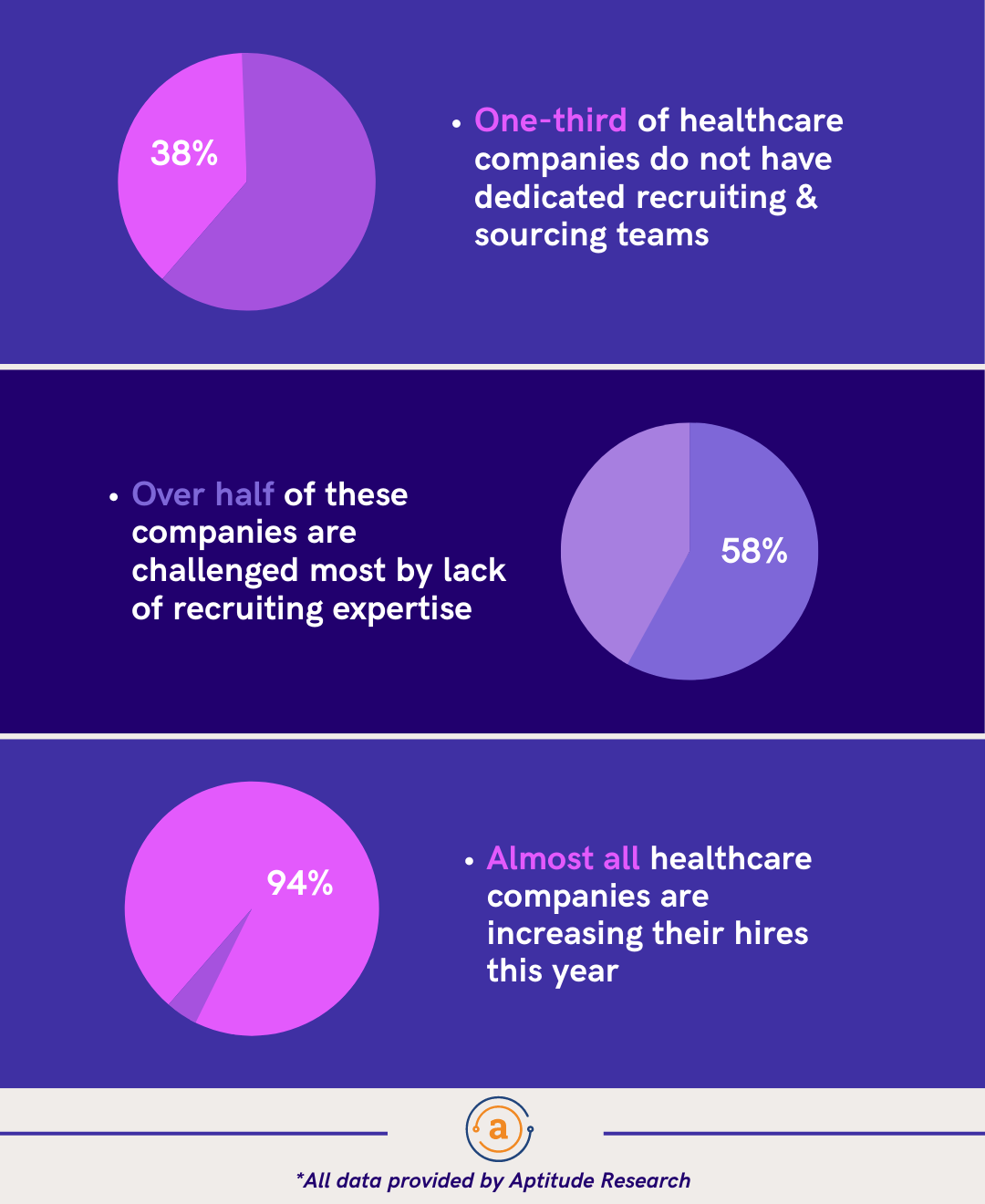Madeline Laurano of Aptitude Research shares her thoughts on the key recruiting challenges in healthcare.
The labor shortage and global pandemic have increased the pressure on recruitment in healthcare with no signs of slowing down. While other industries are preparing for an economic downturn and facing possible layoffs, healthcare remains hyper-focused on growth and competing for talent.
According to the Bureau of Labor Statistics,
"Overall employment in healthcare occupations is projected to grow 13 percent from 2021 to 2031, much faster than the average for all occupations; this increase is expected to result in about 2 million new jobs over the decade. In addition to new jobs from growth, opportunities arise from the need to replace workers who leave their occupations permanently. About 1.9 million openings each year, on average, are projected to come from growth and replacement needs."
Attracting, recruiting, and hiring talent is a critical challenge for healthcare organizations across all job roles, from front-line workers to doctors and nurses to medical technicians. Historically, while other industries have quickly adopted new technology, many healthcare companies have responded slower. But the past two years have forced a new reality for healthcare and increased the interest in TA tech, with 85% of healthcare companies increasing their investment or continuing to invest the same.
Here are some key trends impacting talent acquisition in healthcare based on data collected from Aptitude Research.
- Managing with a Lack of Resources: Many healthcare organizations need more resources or expertise to execute strategic talent acquisition. According to Aptitude Research, 38% of healthcare companies do not have dedicated recruiting and sourcing teams, and 58% of these companies stated that their greatest challenge is a lack of recruiting expertise. The lack of resources is the biggest challenge facing companies today, as 94% of healthcare companies are increasing their hires this year.

-
Improving Candidate Experience through Communication: Candidate communication and experience still need improvement for many healthcare organizations. According to Aptitude Research, 1 in 3 candidates have not heard back from an interview for two or more weeks. Additionally, only 22% of candidates are satisfied with the communication they receive before applying, and only 21% are satisfied with the interview process. Companies must address communication to improve the candidate experience and drop-off rates (40% of candidates are dropping off at the apply phase).
-
Balancing Efficiency and Quality: Healthcare organizations often struggle to balance efficiency and quality. Patient-centered care is critical for these companies, and finding the right talent and efficiency and speed are important when change is constant.
-
Leveraging Automation: Less than half of healthcare companies are using automation throughout the talent acquisition lifecycle. The top areas where companies are investing in automation are recruitment marketing (37%), screening (44%), interviewing (40%), and onboarding (30%). Surprisingly, only 18% of companies use automation for sourcing when attracting talent is a top priority.
Automation can help healthcare organizations lift the administrative burden placed on recruiters and improve candidate communication and engagement.
- Using Contingent Workers: Over 50% of healthcare organizations have increased the number of contingent or contract workers this year. A flexible and extended workforce helps companies fill critical talent gaps, reduce costs, and improve productivity. It also helps companies adapt and adjust to changing business needs - especially during times of uncertainty.
Yet, the challenges remain the same even as the demand for and acceptance of contingent workers increased this past year. Most contingent workforce strategies need more visibility, rely on antiquated technology, and erode business leaders' confidence. Healthcare organizations understand the value, but they only sometimes see the results. This needs to change as companies continue to adopt a more flexible workforce and companies need to invest in the right partners to support them.
Given the competition for talent and labor shortage still impacting healthcare organizations, incremental improvements to existing processes and systems are not enough. Healthcare companies need to think and act differently – breaking old paradigms and embracing tech in a new way.
Author: Madeline Laurano, Founder & Chief Analyst for Aptititude Research
Aptitude Research is a leading human capital management (HCM) research and advisory firm based in Boston. Our in-depth research and vendor assessments help HR leaders develop a deep understanding of the HCM technology landscape, including talent acquisition and engagement, to ultimately make better purchase decisions.
Relode is a technology platform built to solve today's modern hiring challenges. We believe transformation happens when purpose-built tech meets intentional human connection.
Schedule a demo now to see how Relode will simplify and expedite your hiring. You can also check out these employer success stories to learn more about how Relode is transforming hiring outcomes.




